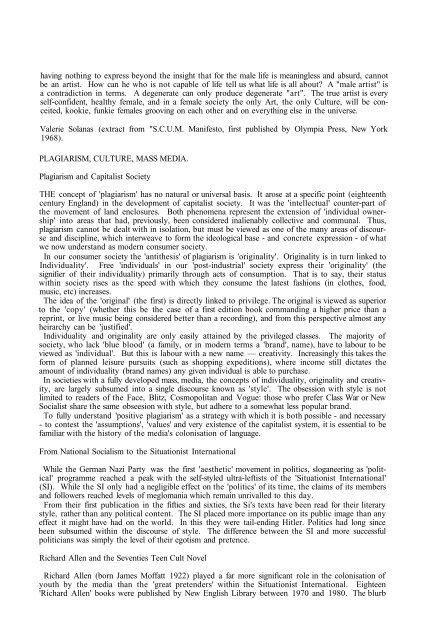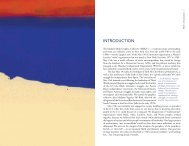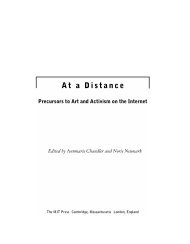Plagiarism: Art As Commodity and Strategies for ... - El plagio literario
Plagiarism: Art As Commodity and Strategies for ... - El plagio literario
Plagiarism: Art As Commodity and Strategies for ... - El plagio literario
You also want an ePaper? Increase the reach of your titles
YUMPU automatically turns print PDFs into web optimized ePapers that Google loves.
having nothing to express beyond the insight that <strong>for</strong> the male life is meaningless <strong>and</strong> absurd, cannot<br />
be an artist. How can he who is not capable of life tell us what life is all about? A "male artist" is<br />
a contradiction in terms. A degenerate can only produce degenerate "art". The true artist is every<br />
self-confident, healthy female, <strong>and</strong> in a female society the only <strong>Art</strong>, the only Culture, will be conceited,<br />
kookie, funkie females grooving on each other <strong>and</strong> on everything else in the universe.<br />
Valerie Solanas (extract from "S.C.U.M. Manifesto, first published by Olympia Press, New York<br />
1968).<br />
PLAGIARISM, CULTURE, MASS MEDIA.<br />
<strong>Plagiarism</strong> <strong>and</strong> Capitalist Society<br />
THE concept of 'plagiarism' has no natural or universal basis. It arose at a specific point (eighteenth<br />
century Engl<strong>and</strong>) in the development of capitalist society. It was the 'intellectual' counter-part of<br />
the movement of l<strong>and</strong> enclosures. Both phenomena represent the extension of 'individual ownership'<br />
into areas that had, previously, been considered inalienably collective <strong>and</strong> communal. Thus,<br />
plagiarism cannot be dealt with in isolation, but must be viewed as one of the many areas of discourse<br />
<strong>and</strong> discipline, which interweave to <strong>for</strong>m the ideological base - <strong>and</strong> concrete expression - of what<br />
we now underst<strong>and</strong> as modern consumer society.<br />
In our consumer society the 'antithesis' of plagiarism is 'originality'. Originality is in turn linked to<br />
Individuality'. Free 'individuals' in our 'post-industrial' society express their 'originality' (the<br />
signifier of their individuality) primarily through acts of consumption. That is to say, their status<br />
within society rises as the speed with which they consume the latest fashions (in clothes, food,<br />
music, etc) increases.<br />
The idea of the 'original' (the first) is directly linked to privilege. The original is viewed as superior<br />
to the 'copy' (whether this be the case of a first edition book comm<strong>and</strong>ing a higher price than a<br />
reprint, or live music being considered better than a recording), <strong>and</strong> from this perspective almost any<br />
heirarchy can be 'justified'.<br />
Individuality <strong>and</strong> originality are only easily attained by the privileged classes. The majority of<br />
society, who lack 'blue blood' (a family, or in modern terms a 'br<strong>and</strong>', name), have to labour to be<br />
viewed as 'individual'. But this is labour with a new name — creativity. Increasingly this takes the<br />
<strong>for</strong>m of planned leisure pursuits (such as shopping expeditions), where income still dictates the<br />
amount of individuality (br<strong>and</strong> names) any given individual is able to purchase.<br />
In societies with a fully developed mass, media, the concepts of individuality, originality <strong>and</strong> creativity,<br />
are largely subsumed into a single discourse known as 'style'. The obsession with style is not<br />
limited to readers of the Face, Blitz, Cosmopolitan <strong>and</strong> Vogue: those who prefer Class War or New<br />
Socialist share the same obseesion with style, but adhere to a somewhat less popular br<strong>and</strong>.<br />
To fully underst<strong>and</strong> 'positive plagiarism' as a strategy with which it is both possible - <strong>and</strong> necessary<br />
- to contest the 'assumptions', 'values' <strong>and</strong> very existence of the capitalist system, it is essential to be<br />
familiar with the history of the media's colonisation of language.<br />
From National Socialism to the Situationist International<br />
While the German Nazi Party was the first 'aesthetic' movement in politics, sloganeering as 'political'<br />
programme reached a peak with the self-styled ultra-leftists of the 'Situationist International'<br />
(SI). While the SI only had a negligible effect on the 'politics' of its time, the claims of its members<br />
<strong>and</strong> followers reached levels of meglomania which remain unrivalled to this day.<br />
From their first publication in the fifties <strong>and</strong> sixties, the Si's texts have been read <strong>for</strong> their literary<br />
style, rather than any political content. The SI placed more importance on its public image than any<br />
effect it might have had on the world. In this they were tail-ending Hitler. Politics had long since<br />
been subsumed within the discourse of style. The difference between the SI <strong>and</strong> more successful<br />
politicians was simply the level of their egotism <strong>and</strong> pretence.<br />
Richard Allen <strong>and</strong> the Seventies Teen Cult Novel<br />
Richard Allen (born James Moffatt 1922) played a far more significant role in the colonisation of<br />
youth by the media than the 'great pretenders' within the Situationist International. Eighteen<br />
'Richard Allen' books were published by New English Library between 1970 <strong>and</strong> 1980. The blurb






